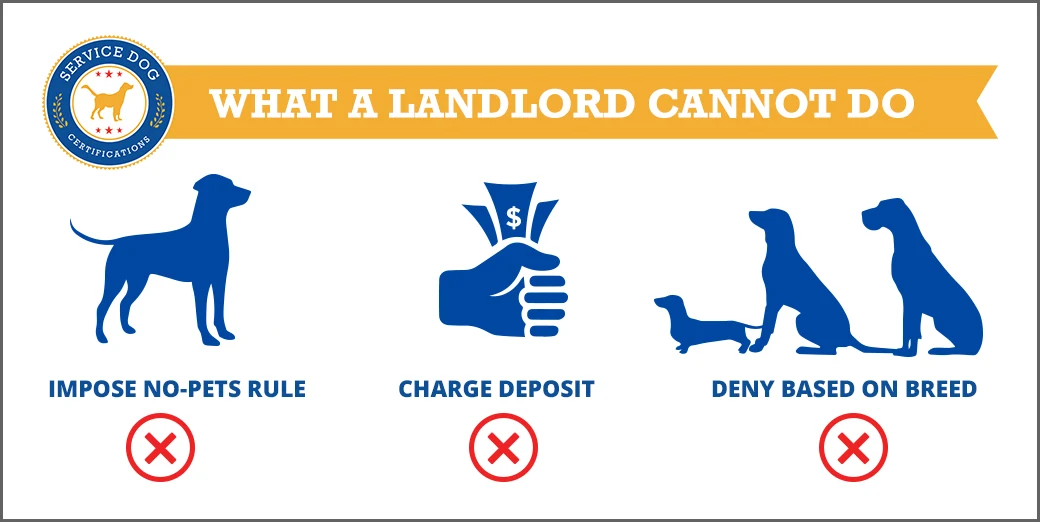Home Page › Blog › Can Landlords Deny a Service Dog?
Can Landlords Deny a Service Dog?

Under the Fair Housing Act, housing providers such as landlords, HOAs, co-ops, and condos must reasonably accommodate service dogs. Housing providers can only deny a tenant’s request to live with their service dog in limited circumstances. In this article, we’ll explore what these exceptions are and what rights you have as a service dog owner in residential housing.
Laws that Protect Assistance Animals in No Pet Housing
There are two types of assistance animals with special housing rights: service dogs and emotional support animals. If you have a mental or physical disability that requires you to have either a service dog or an emotional support animal, you are protected from discrimination under the federal Fair Housing Act. Service dog owners have the following rights:
- Access to “no pets” policy housing
- Exemption from monthly pet fees
- Exemption from pet deposits
- Exemption from breed or weight restrictions
Housing providers must accommodate assistance animals unless they have a valid exemption, even if their building has a policy that bans all pets. Under federal Fair Housing rules, service dogs and emotional support animals are not considered pets and are thus not subject to rules that apply to normal pets.
A major difference between an emotional support animal and a service dog is that service dogs must be individually trained to perform a task or job relating to the handler’s disability. Emotional support animals, on the other hand, do not undergo any specialized training and assist with mental health disabilities just by being present in their owner’s life.
When can a landlord reject a service dog?
The right to live with your service dog is not absolute. Landlords can reject a tenant’s request to live with their service dog if they have a valid exemption. For example, if the landlord has determined that the tenant’s service dog poses a health or safety risk to others, they may properly deny accommodation if the risks can’t be mitigated.
Some smaller landlords are also exempt from Fair Housing requirements. The Fair Housing Act exempts owner-occupied buildings with no more than four units and single-family houses sold or rented by the owner without an agent.
Landlords cannot reject a service dog solely because they merely perceive it as dangerous or a health risk to others without evidence. Landlords cannot deny a service dog, for example, solely because it is a certain breed.
Fair Housing rules also override any building policies that ban pets. A housing provider cannot deny a service dog accommodation because their building has a strict ban on all animals. A housing provider also can’t deny a service dog for being too big just because their building has a size/weight restriction on pets.

How can a landlord verify a service dog?
Under HUD guidelines, housing providers are permitted to verify a service dog by asking two questions:
- “Is the animal required because of a disability?” and
- “What work or task has the animal been trained to perform?”
Housing providers are never permitted to ask about the nature or extent of a tenant’s disability or demand documentation as proof of service dog status. However, under HUD guidelines, housing providers are allowed to make the truth and accuracy of information provided during the service dog request part of the representations made by the tenant. This applies under a lease or housing agreement to the extent that the lease or agreement requires the truth and accuracy of other material information.
What that essentially means is that if you lie about the status of your service dog, your landlord may have the right to take actions against you under the terms of your lease. It’s also common sense that faking the need for a service dog is unethical, but it is also outlawed in many jurisdictions.
Overview on Service Dog Access Rights
Service dog owners have rights when it comes to housing and public access rights under the Americans with Disabilities Act. When you have a legitimate service dog, you have the right to access areas where the general public is allowed. This can include retail locations, restaurants, hotels, and beaches. Service dogs can also accompany their handlers in the cabin of airplanes free of charge.

Certifications and Vests for Service Dogs
Certificates, ID cards, and vests are not mandatory for service dogs, but many service dog owners choose to use them. You can obtain these items after your service dog has been fully trained to perform the task or job related to your disability.
Registering a service dog and obtaining items like certificates, ID cards, and vests help signal to other tenants in your building and members of the public that your dog is a working animal. It can help dispel any confusion about why your service dog is present, especially if your building has a ban on pets.
You can register your service dog here: Service Dog Certification.
You can also purchase a service dog vest at this link: Service Dog Vest.
Having a certificate, vest, or ID card for your service dog is an easy way to let others know that your canine companion is a working animal and, therefore, should be treated as such.
About the Author: The writing team at Service Dog Certifications is made up of folks who really know their stuff when it comes to disability laws and assistance animals. Many of our writers and editors have service dogs themselves and share insights from their own experiences. All of us have a passion for disability rights and animals.
Latest Posts

How to Bring a Service Dog to Disneyland
Trained service dogs are more than welcome to join their handlers at Disneyland. In this guide, we’ll explain Disneyland’s policies and give practical advice for bringing a service dog to Disneyland for the first time. Disneyland’s Service Dog Policies The Magic Kingdom is happy to welcome trained service dogs across most park locations! They kindly […]

Read More

Can Dogs Eat Tomatoes?
Yes! Dogs can safely enjoy tomatoes, but there are a few risks to be aware of so you can feed your dog responsibly. Fully ripe tomatoes (without the stems and leaves) can actually have nutrients that are good for your pup. Tomatoes have chlorogenic acid, an antioxidant that can have anti-inflammatory effects in cells. They’re […]

Read More

Can a Primary Care Doctor Write an ESA Letter?
Your family doctor, also called a primary care physician (PCP), can write a letter recommending an emotional support animal. We’ll explain what legally gives them that ability and explore what better options might be available for you. Why are Physicians Able to Write an ESA Letter? To turn your pet into an emotional support animal, […]

Read More







Thank you for that very informative article!
We are offering pet free short term housing through Airbnb in our House in New Hampshire. We have had now a couple of inquiries from people traveling with service animals. But our entire home is shared with us the land lords and up to 4 guests.
We now had incidents where tenants were forced to leave early because of a high allergy to animal hair when a person with a service animal checked in. Because our guests change frequently and often, we can’t keep track and ask for prove of allergies or other reasons why the are not capable to live with animals. Most of these guest choose us especially we are pet free and they don’t have to worry. We would like to refuse service animals without the intention to discriminate but to protect our other guests but we are not able to find any legal advice online regarding this topic especially with shared living space.
We would love to have certainty on this topic and would appreciate any advice.
(Btw we do offer a privat apartment where we happily host our furry friends plus their humans 😊)
Cheers
It’s very difficult to deny accommodation to a service dog handler unless the presence of the dog is causing a direct health or safety threat to others during their stay. One option could be to have a deeper cleaning after an extended stay by a service dog, or to inform guests staying immediately after that a service dog was present in case anyone is hypersensitive to dog allergens.